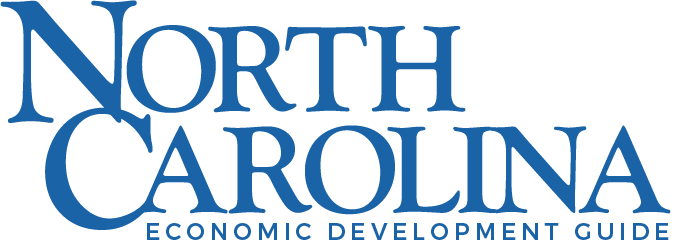Focus: Triad region, scoring big wins
The Triad and Carolina Core score big wins and prepare for more. Within less than 12 months, the region landed four big employers that are investing more than $13 billion in new facilities.
—By Katherine Snow Smith and Kathy Blake
Keeping up with the economic development activity in North Carolina’s Triad region can lead to whiplash with all the head-turning from one big announcement to the next.
Toyota Motor in late 2021 announced that it’s building a $1.3 billion electric-battery factory at the Greensboro-Randolph Megasite and creating 1,750 jobs. It followed up in August with a $2.5 billion expansion and another 350 jobs when construction is completed.
A few months later, Boom Supersonic decided on Guilford County for the assembly of the world’s fastest airplane at Piedmont Triad International Airport. The Colorado-based company plans a $500 million manufacturing facility that will construct its Overture airplanes. It has pledged it will hire 1,750 employees by 2030 and create a workforce of more than 2,400 employees by 2032.
Then in March, Vietnamese carmaker VinFast announced plans to invest $4 billion in a manufacturing operation at Chatham County’s Triangle Innovation Point. The company expects to hire 7,500 employees over the next five years.
In September, Durham-based chip maker Wolfspeed picked the Chatham-Siler City Advanced Manufacturing Site for a $5 billion silicon carbide semiconductor plant. It expects to create at least 1,800 jobs paying an average of $77,753 a year.
These companies’ decisions to plant some serious Triad roots have drawn national and international attention. The Toyota, Boom, and Wolfspeed plants are within 30 miles of downtown Greensboro, while VinFast’s site in eastern Chatham County is closer to Raleigh and Durham.
“I think we are definitely on the map now if you’re moving your company,” says Mike Fox, president of the Piedmont Triad Partnership. Businesses throughout the South and up and down the East Coast have known the region’s advantages for decades. Now there’s even more awareness.
Fox cites the area’s draws: “The workforce, the available land, the ease of living, the cost of living compared to a lot of other places, the low tax structure, the workforce development programs, the excellent universities and other schools.”
Piedmont Triad International Airport and the vast open acreage around are also big lures, especially to commercial aerospace companies.
“With some of the country’s best and brightest aviation talent, key suppliers, and the state of North Carolina’s continued support, Boom is confident that Greensboro will emerge as the world’s supersonic manufacturing hub,” Blake Scholl, founder and CEO of Boom Supersonic, said in a release about his company’s decision.
Toyota leadership echoes his sentiments.
“The future of mobility is electrification and the Greensboro-Randolph Megasite is the ideal location to make that future a reality,” Ted Ogawa, CEO of Toyota Motor North America, said in a release. “North Carolina offers the right conditions for this investment, including the infrastructure, high-quality education system, access to a diverse and skilled workforce, and a welcoming environment for doing business.”
Toyota shared its relocation “wish list” that made the 1,800-acre Greensboro-Randolph Megasite rise above other finalists.
■ An extensive and well-maintained highway system for overland logistics
■ Four international airports and two seaports
■ Onsite rail
■ An outstanding, diverse workforce
■ Renewable energy availability
■ World-renowned education system
■ Strong government partnership at both the state and local levels
State, county and local incentives also make a difference. These four companies alone will receive more than $2.5 billion from government entities for infrastructure and job creation.
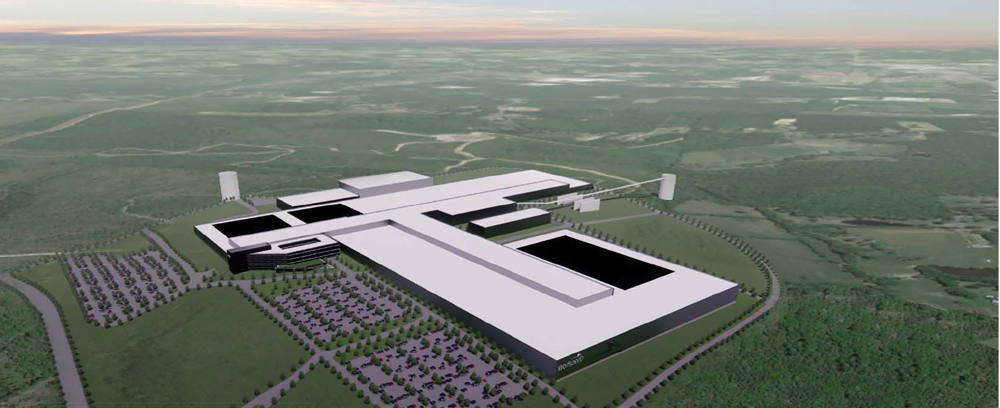
Rendering of Wolfspeed’s new facility.
A FIELD OF JOBS
The Triad’s counties are Surry, Stokes, Rockingham and Caswell along the Virginia line, and Forsyth and Guilford at the center, surrounded by Yadkin, Davie, Davidson, Randolph, Montgomery and Alamance. Four years ago, the Piedmont Triad Partnership dubbed the area the foundation of the Carolina Core, where low tax rates, 2 million workers and 7,200 acres of certified land are attracting businesses, small and large.
Threaded together by a 120-mile stretch of U.S. 421 from Dunn to Yadkinville, the Carolina Core adds five counties — Chatham, Cumberland, Harnett, Lee and Moore. When the Carolina Core initiative was announced in August 2018, the Partnership said one of the measures of success would be to create 50,000 jobs in the region over the next 20 years.
Since then, more than 37,900 new jobs have been announced.
“We’re tracking ahead of schedule, absolutely,” Partnership spokesperson Melanie Jennings says.
Fox acknowledges with a laugh that they probably need to adjust the jobs forecast.
“There’s a delicate balance between meeting your goal and moving the goal line,” he says. “When we said 50,000 was the goal it was a very different landscape. These megasites were not totally in play yet. It’s really just in the past 12 months that we’ve picked up such great momentum. We were getting singles and doubles but these home runs are accelerating things.”
The Carolina Core’s four certified megasites totaling 7,100 acres give plenty of room for playing ball.
The 1,800-acre Greensboro-Randolph Megasite that’s welcoming Toyota is minutes from I-40 and I-85. The Chatham-Siler City Advanced Manufacturing Megasite has 1,800 acres of certified, shovel-ready land powered by excellent logistic and high capacity utilities. The 2,500-acre Moncure Megasite in Chatham County is close to Raleigh, the state capital, and Research Triangle. It’s within 45 miles of three Tier 1 research universities: UNC Chapel Hill, N.C. State University in Raleigh and Duke University in Durham.
And the Piedmont Triad International Airport 1,000-acre megasite that will be home to Boom Supersonic offers tenants runway access among other in-demand amenities.
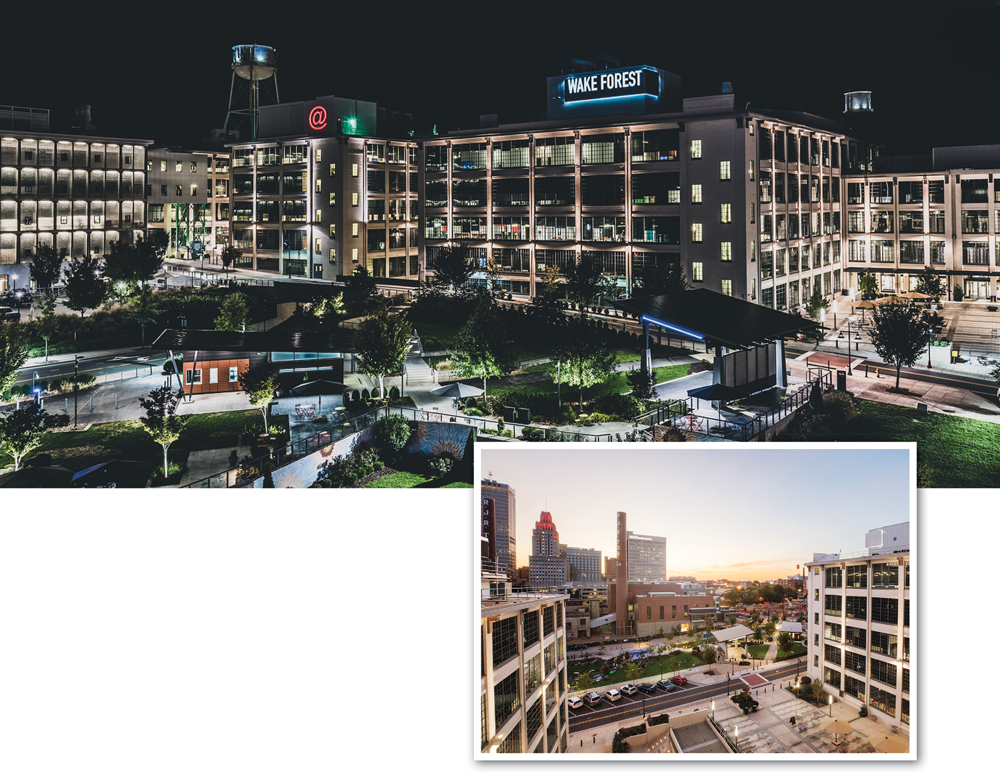
Innovation Quarter in Winston-Salem
COVERING ALL THE BASES
It’s not just just the “big dogs” that are attracted to the Triad and Carolina Core. The region has lures and supports for small businesses and entrepreneurs, too. Fox and his economic development partners across the region say it thrives with all sizes of employers. “We’re still chasing and winning those singles and doubles, too,” he says.
Nature’s Value, which is relocating from New York, will create 183 jobs and invest $19 million in a new headquarters and vitamin factory in Winston-Salem’s Whitaker Park.
Charlotte-based Nucor, the largest U.S. steel producer, is opening a $350 million plant in Lexington in Davidson County that will employ 180 people. Children’s clothing manufacturer LT Apparel Group is investing $57 million at Greensboro’s Reedy Fork Corporate Park and will create 116 jobs.
Commercial equipment provider Altec is expanding near Mount Airy, investing $9 million and creating 100 jobs. And flooring manufacturer Mohawk Industries is spending $87 million in an expansion that will create 87 jobs in Davidson County over the next three years.
Technimark, a manufacturer of injection-molded components, is investing $62 million in a Randolph County facility where it plans to employ 220.
“NorthPoint (Developers), one of the largest industrial developers and landlords in the country, manages over 105 million square feet of property. It’s developing a park in Kernersville,” Fox adds. The number of tenants and their employees are not yet known, but this is another big source of new jobs.
New, relocating and expanding small businesses all make a big impact.
“For every Toyota there are a thousand mom-and-pop small businesses out there, all working together to make the economy work,” Fox points out.

Congdon Yards in High Point
Congdon Yards in High Point is one of many facilities throughout the Triad catering to small businesses and entrepreneurs. Three historic buildings including a former hosiery factory now provide space for retail, restaurants, small business and start-ups. Construction of a Spring Suites by Marriott is also underway.
The Innovation Quarter in Winston-Salem has 2.1-million square feet of office laboratory and educational space. It’s home to 90 companies, 1,000 residents, five academic institutions (including Wake Forest University), myriad community-based art projects and green walkways dotted with restaurants, cafes and galleries.
Whitaker Park is another innovative commercial space on 220 acres in Winston-Salem, for businesses of varying sizes. The manufacturing complex was donated by Reynolds America to Winston-Salem and Forsyth County. It served as R.J. Reynolds Tobacco’s main cigarette manufacturing facility and at one time was the largest plant in the world. Redevelopment of the site will generate thousands of jobs. The complex is located two miles north of downtown Winston-Salem and directly adjacent to Wake Forest University. As noted above, Nature’s Value is opening its facility there. Robert Leak, president and chief executive officer of Whitaker Park Development Authority, offers these other updates.
■ Second Harvest Food Bank is building their new headquarters and bulk distribution center on the site.
■ Brennan Investments purchased an 84,000-square-foot building and is in the process of remodeling. There is strong interest from companies wanting to lease space.
■ JC Harris purchased a 2.7-acre site and is working on plans for a 25,000-square-foot spec building.
■ A 160-unit apartment project will be completed by mid 2023. The developer has optioned adjacent sites and is considering a mid-rise hotel or additional apartments.
■ Forsyth County owns two small warehouses and leases them to the school system.
■ A lab building is home to Virtue Labs and Nanosoft Polymers.
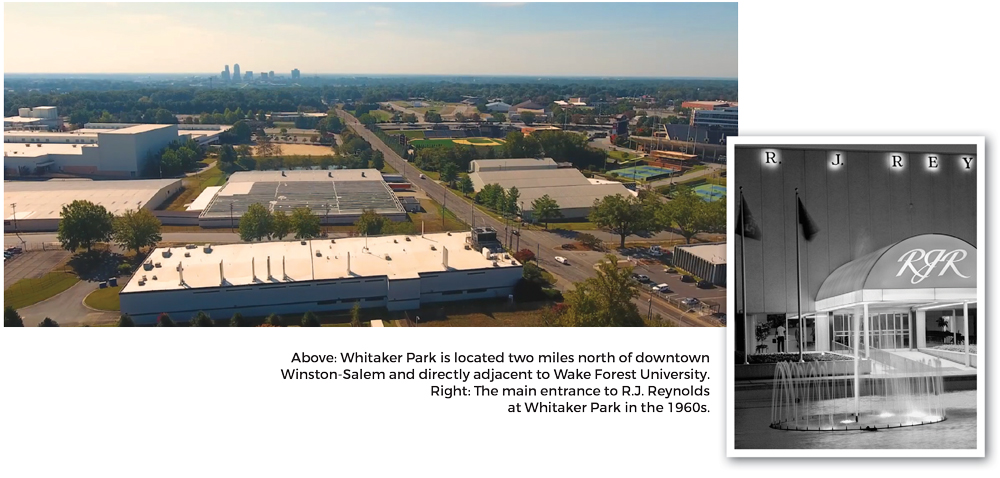 EXCELLENT ACCESS
EXCELLENT ACCESS
Whitaker Park has a Norfolk Southern rail spur onsite and is less than 30 minutes from Piedmont Triad International Airport and FedEx’s regional hub. The park has quick access to major interstates, including I-40, I-85, and future I-74. And it’s not just Whitaker Park that’s well connected. The Triad’s easy access to top notch transportation for all of its residents and worksites is a major draw.
The N.C. Department of Transportation is preparing a study and application for federal review, and two new interstate-quality interchanges will provide access to Toyota’s site from U.S. 421.
The $1 trillion infrastructure bill, which President Biden signed in November 2021, brings hopes of accelerating U.S. 421’s journey toward becoming Interstate 685, though money has yet to be designated.
“Connecting two of North Carolina’s most active interstate corridors — I-85 and I-95 — will mean that Future 685 can offer alternative and redundant access for goods and people moving through the center of our state in the event of storms and weather disruptions,” says Piedmont Triad Partnership’s Fox. “Oftentimes, companies looking to locate a new project want to be close to an interstate highway and may rule out a site that is not within a certain distance of the interstate. Designating the U.S. 421 corridor not only makes the Chatham County megasites more desirable in many consultants’ eyes but also brings interstate access to industrial sites in Lee, Harnett and Randolph counties.”
Interstate 685 would move more than goods. It would connect people to jobs, too. “It’s kind of obvious that if we have an interstate-level road that runs east and west, it does nothing but help us to access employees who would want to work at the airport,” says Kevin Baker, executive director of Piedmont Triad Airport. “Highway 421 is good, but it has its downfalls, like the occasional traffic signal, and having a full interstate would certainly be beneficial. There are a lot of growing communities [southeast of PTI], and especially given the news of the Greensboro-Randolph site, a whole lot of people are going to need a place to live. They are going to need housing, and they will need a place to fly.”
The interstate designation has a military component, too. U.S. 421 runs a few miles from Fort Bragg, the U.S. Army’s largest installation by population and home to the famed 82nd Airborne Division and Special Operations Command.
“It would be a huge advantage from a military readiness perspective as well as continuity of services and so forth,” says Kevin Lacy, a N.C. Department of Transportation traffic engineer.
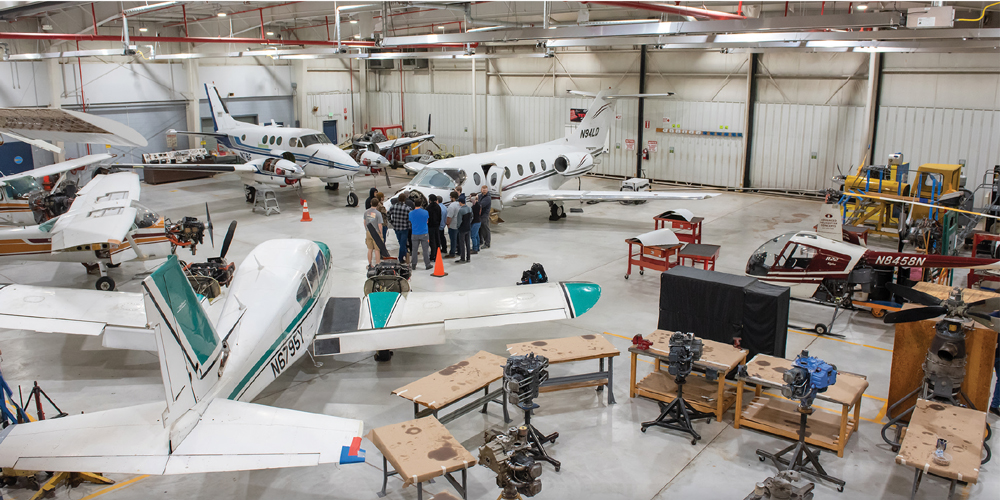
Aviation Systems Technology at Guilford Technical Community College
EDUCATING A SUPERIOR WORKFORCE
The Triad’s educational and workforce development opportunities are vast and varying. The area is home to 21 colleges and universities, which enroll more than 100,000 students, according to the Piedmont Triad Regional Council.
The region’s community colleges regularly customize training to individual needs of businesses. They support many industries, including advanced manufacturing, aviation and aerospace, automotive, biomedical and life sciences, technology, entrepreneurship, and logistics.
“We are particularly excited and proud to not only expand Wolfspeed’s footprint in our home state of North Carolina, but also our relationship with North Carolina Agricultural and Technical State University to develop a workforce of the future,” says Gregg Lowe, President and CEO of Wolfspeed, when he announced the company’s $5 billion facility. Wolfspeed is also partnering with the N.C. Community College System for other customized training programs.
Another educational asset, Jamestown-based Guilford Technical Community College, offers more than 70 workforce training programs, including several in medical fields. It has three in aviation manufacturing, including a structures assembly program.
A portion of community college students are hired by the more than 200 aviation and aerospace companies that have landed in the region, particularly at PTI airport and in Greensboro, High Point and Winston-Salem. “Aviation and aerospace are key growth sectors for our region,” Fox says.
The Piedmont Triad leads the state in the number of students enrolled in local community college aviation programs, with more than 500 students enrolled in Guilford Technical Community College programs alone. The college’s Aviation Campus in Greensboro is one of the Southeast’s best equipped maintenance training facilities.
Forsyth Technical Community College’s $16-million Mazie S. Woodruff Aviation Technology Lab, which opened at Smith Reynolds Airport in Winston-Salem in late 2021, will train students to meet the high demand for aircraft maintenance and avionics technicians. The facility honors Mazie Spencer Woodruff, the first African American elected as a Forsyth County commissioner and a champion of education and social justice.
It has a 15,356-square-foot hangar that can house up to eight aircraft. Students learn to work with sheet metal and composites, electronics, paint, and piston and turbine engines in its classrooms and labs. “Talent in the Carolina Core has a strong work ethic,” says Michimasa Fujino, recently retired president and CEO of Honda Aircraft Co., which established its Greensboro headquarters in 2006 and employs 1,500 in research and development, manufacturing and customer service.
The region’s focus on aviation technology and manufacturing clearly was a lure for Boom and its plan to build a workforce to construct its Overture plane. The aircraft, which was featured on “60 Minutes,” will carry up to 88 passengers at twice the speed of today’s fastest passenger jet and be powered by fuel made from sustainable and renewable sources.
In August, American Airlines announced the company is buying up to 20 Overture aircraft, with an option for an additional 40.
The Boom Supersonic facility will sit on 65 acres, leaving 1,000 acres at PTI airport available for other employers.
“One of the main messages we want to make sure everyone understands is we’ve had all this success (landing big employers) and it’s validating. We’ve been at it for a long time,” says Fox. “But we are still open for more business.” ■
